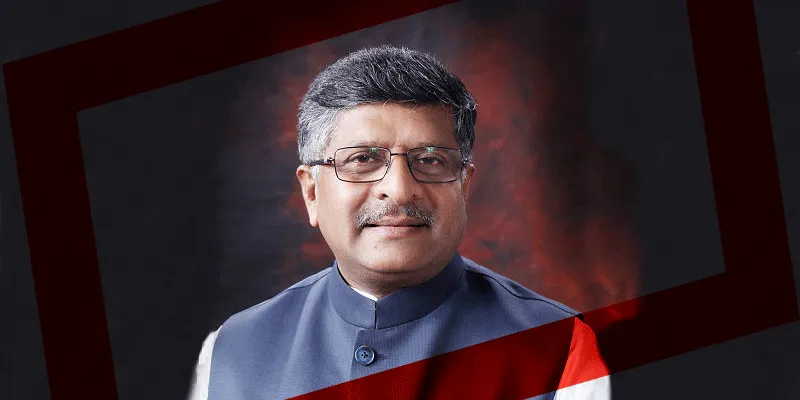[Roundup] Takeaways from Ravi Shankar Prasad's Digital India townhall with Indian entrepreneurs
As India entered the fifth year of its Digital India initiative, YourStory Founder and CEO Shradha Sharma hosted an exclusive #DigitalIndiaTownhall for Indian entrepreneurs with IT Minister Ravi Shankar Prasad.
To commemorate five years of Digital India, Ravi Shankar Prasad, Union Minister for Communications, Electronics & Information Technology and Law & Justice, went live with India’s tech entrepreneurs in a virtual event hosted by YourStory Founder and CEO Shradha Sharma.
In the exclusive #DigitalIndiaTownhall for Indian entrepreneurs, the Minister interacted with some of India's leading startup founders, stating:
“Digital India is designed for the following: 1) to empower Indians with the power of technology, 2) to bridge the digital divide, and 3) for digital inclusion.”
The webinar saw the participation of Vijay Shekhar Sharma, Founder and CEO, Paytm; Naveen Tewari, Founder and CEO, InMobi; Sujeet Kumar, Co-founder, Udaan; Mukesh Bansal, Founder and CEO, Curefit; Harshvardhan Lunia, Co-founder and CEO, Lendingkart; Tanuj Shori, Co-founder and CEO, Square Yards; Dr Geetha Manjunath, Co-founder, CEO, Niramai; Dr Taslimarif Saiyed, CEO and Director, C-CAMP; Rajesh Yabaji, Co-founder and CEO, BlackBuck; and Vivekananda Hallekere, Co-founder and CEO, Bounce.

Ravi Shankar Prasad, Union Minister for Communications, Electronics & Information Technology and Law & Justice
During the session, the Union Minister emphasised the importance of digital inclusion and how it was central to the government's Digital India programme.
“Inclusion central to my approach in digitising India”
The digital-first model in India will succeed only if the common man has a stake in the government's endeavour, said Ravi Shankar Prasad.
The IT Minister explained that the Digital India programme was designed to empower Indians with the power of technology, bridge the digital divide, and ensure digital inclusion.
Now, five years after the launch of Digital India, there is a "sense of fulfilment" at the achievements made through the government's Digital India drive, the Union Minister said, adding that now "no leader opposes Digital India", having seen its benefits.
He called on the startup ecosystem to focus on building solutions for digital education, healthtech, as well as homegrown apps following the ban on 59 Chinese apps on Monday.
“India inviting 5 global electronics manufacturers to 'Make in India' and export”
The minister said the government was inviting “five global champions” to manufacture electronics in India and export to global markets. He did not name the five businesses, but said the move to invite the global electronics champions was part of the Production-Linked Incentive (PLI) scheme for large-scale electronics manufacturing.
The PLI scheme is a Rs 50,000 crore initiative approved by the Union Cabinet in March 2020 and launched in June 2020.
“The government is focusing on electronics manufacturing as the nation cannot survive without electronics, right from mobile handsets, smartphones, medical devices, consumer electronics, etc. In India, we have all the human resources and technology needed to focus on electronics manufacturing,” he said.
The minister added that in the past five years, the number of smartphone manufacturers in India grew from two to over 60, and the government now wanted to make Indian companies competitive in global markets.
“Aatmanirbhar Bharat is resurgent India”
"Aatmanirbhar Bharat does not mean India in isolation. Aatmanirbhar Bharat means a resurgent India,” said Ravi Shankar Prasad.
According to him, a resurgent India was possible only when India made the most of its talent and creativity.
"Why should India export from international markets things that are already available?" he asked, giving the examples of the Indian handloom, toy, and firecrackers industries.
He further added with the kind of ecommerce and digital payment startups that are growing in India, Indian companies had the "innate potential to become a component of the global world".
“CSCs important for digital inclusion of rural India”
The Indian government’s special purpose vehicle, Common Service Centres (CSC) or Digital Seva Kendras, play a significant role in improving the digital infrastructure in the rural areas of the country.
Taking to Twitter, the Union Minister said CSCs were important to make ‘Digital Inclusion of Rural India’ a reality.
According to the minister, 12 lakh direct and indirect jobs have been created via CSCs, including providing employment to over 38,000 female village-level entrepreneurs (VLEs).
Platform for the common man
The Union Minister said entrepreneurs needed to focus on creating platforms that would “resonate with the common people” and gave them a say.
While addressing entrepreneurs during the online event, the minister also requested Indian innovators to come up with a “platform for farmers where they can have access to all the information they need for better results in the rural parts of India”.
“India downloads a lot of apps, uploads very few”
India is a country where apps are downloaded a lot, but not uploaded, Ravi Shankar Prasad said.
The minister emphasised that Indian startups have a golden opportunity now to fill the vacuum for homegrown apps, following the government's decision to ban 59 Chinese mobile apps.
"India me app download bahut hota hai. India me upload nahi hota. But I'm confident Indian startups can do it. We have the capability and I appeal to startups to make this happen," the minister said.
At the townhall, the Cabinet Minister also called on the startup ecosystem to focus on building solutions for digital education and healthtech.
India aims to have a $1T digital economy
Union Minister Ravi Shankar Prasad said India aimed to create a digital economy of $1 trillion, powered by startups. Setting out this agenda before well-known Indian startup founders, the minister said, “India’s digital economy must be $1 trillion.”
“We are going to set up incubation centres across the country for next-generation technologies,” the minister said.
When Paytm Founder Vijay Shekhar Sharma asked the minister how he dealt with negativity — something entrepreneurs have to constantly deal with — he said one needed to stand out of the group to make a mark but it needed to be accompanied by hard work and intelligence.
The minister told startup founders, “You are all creating a new benchmark and writing a new narrative in the empowerment of India.”
“Startups must invoke AI, blockchain to help reform healthcare, agriculture”
During the townhall, the Union Minister urged entrepreneurs to invoke artificial intelligence (AI) and blockchain technologies to help reform sectors like healthcare and agriculture.
"The government is thinking of a health stack or a healthcare platform, like the UPI. I am very happy that healthcare startups are working in the field of AI," the minister said.
Speaking about the use of AI in healthcare, Geetha Manjunath, Founder, Niramai, said, artificial intelligence (AI) can save lives in rural India in two ways. She explained, “Firstly, in villages where doctors cannot go, AI robots can act as triage solutions to determine which patients should be brought to hospitals for further diagnosis. Secondly, the move will make healthcare affordable in India.”
Geetha urged the minister to make primary healthcare centres (PHCs) AI-enabled, to dispense affordable and quality healthcare in rural pockets of the country.
Lauding Niramai’s efforts in the healthcare sector, the IT Minister said, “The author of 'AI Superpowers' Kai-Fu Lee was suffering from third-stage cancer, according to his doctor. However, Lee used AI to disapprove the doctor and told him that it was first-stage cancer. That’s the power of AI in healthcare.”
(Edited by Teja Lele Desai)


![[Roundup] Takeaways from Ravi Shankar Prasad's Digital India townhall with Indian entrepreneurs](https://images.yourstory.com/cs/2/bd251c60-2d6a-11e9-aa97-9329348d4c3e/Ravi-Shankar-Prasad1562160297974.png?mode=crop&crop=faces&ar=2%3A1&format=auto&w=1920&q=75)






